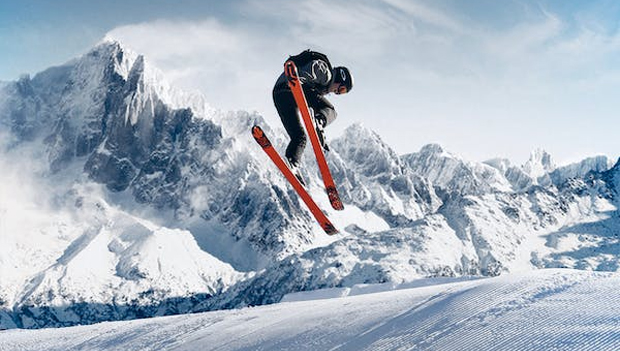
If you want the one-ski quiver that can do everything from groomed snow, hardpack, and off-piste to backcountry's fresh deep powder, then the versatile all-mountain skis are the best options to choose from. All-mountain skis are defined by their waist width underfoot, the width of the ski where they are narrowest. All-mountain skis generally range from 85-105 millimeters waist width. There is no shortage of complexity in features to understand what kind of ski you should select. Brands list their models as the best all-mountain skis year after year. With the technological advancements in the construction of skis and various ski profiles available, it may be perplexing for you to understand the differences. They're far more nuanced than selecting the best ski gloves, ski helmets, or ski goggles to pair your all-mountain skis with. Narrowing down your preferences will help you choose the best all-mountain skis.
The best place to start is to understand your skiing style, your height and weight, and what terrain you are most likely to ski on. There are several factors to consider while choosing the best all-mountain skis, like stiffness or how much they flex, length, the material used to build them, turn radius, and camber/rocker profile. These will determine the characteristics of your skis and how they will behave when you are skiing.
We will describe the various features and best models across different categories below to help you select the best all-mountain skis for you. The ACTIVE Reviews Team researched multiple parameters like their performance, stability, flotation, kind of materials used to build, versatility, and forgiveness and listed our top picks in each category.
Why Trust Us?
ACTIVE.com's editorial team relies on the knowledge and experience of fitness and wellness experts including competitive athletes, coaches, physical therapists, nutritionists, and certified trainers. This helps us ensure the products we feature are of the highest standard. Collectively, the team has spent countless hours researching equipment, gear, and recovery tools in order to create the most accurate, authentic content for our readers. Customer satisfaction is also a key part of our review process, which is why we only feature products that are highly rated.
The Best All-Mountain Skis - Our Top Picks
By clicking on the product links in this article, we may receive a commission fee at no cost to you, the reader. Sponsorships and affiliate commissions help support our research so we can help you find the best products. Read the full affiliate disclosure here.
- Best Overall: Nordica Enforcer 94 Skis
- Best Twin-Tip All-Mountain Skis: Armada ARV 84 Skis
- Best All-Mountain Skis for Women: Nordica Santa Ana Unlimited 88 Skis
- Best All-Mountain Skis for Intermediate: Icelantic Pioneer 96 Skis
- Best Budget All-Mountain Skis: K2 Reckoner 92 Skis
- Best All-Mountain Skis for Men: Volkl M6 Mantra Skis
- Best All-Mountain Skis for Beginners: Blizzard Thunderbird Sport 7.2 Skis
- Best All-Mountain Skis for Powder: Salomon QST 106 Skis
- Best All-Mountain Skis for Groomers: Rossignol Sender 94 Ti Skis
- Best All-Mountain Skis for Hard Snow: Kastle MX83 Ski
Best Overall - Nordica Enforcer 94 Skis
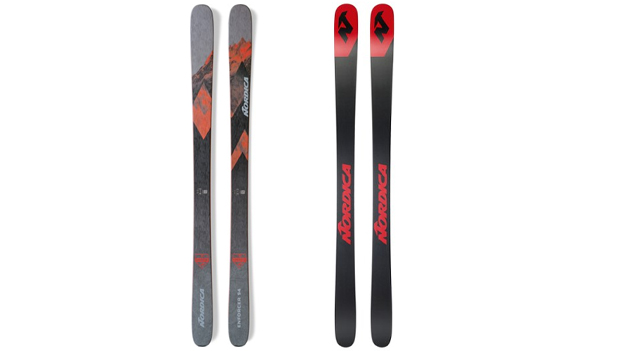
SPECS
- Size: 165cm, 172cm, 179cm, 186cm, 191cm
- Weight (Pair): 9 lbs. 2.8 oz. (for 179cm)
- Material: Wood/metal
- Waist width: 94mm
- Ski terrain: Groomed
The Nordica Enforcer 94 ski's do-it-all attitude makes it the best overall ski in the all-mountain category. The playful design and greater use of carbon fiber make it lightweight. In-built metal sheets make it easy to transfer power at higher speeds and help in precise turns. The design features excellent maneuverability and is quite forgiving at low speed.
The carbon chassis holds a wooden core between metal sheets that dampens the vibrations for a smoother ski ride. It grips pretty well on hardpack snow surfaces. No matter the terrain you throw these skis on, their design will give you an exceptionally secure feeling that will leave you with a broad smile at the bottom of the hill. The sturdy design does not throw unpredictability even when the conditions become choppy. Enough rocker at the tip and tail encourages smooth transition at turns. Nordica Enforcer 94 skis are best suited for intermediate to advanced skiers.
What We Like
- Well-rounded design
- Versatility
- Safe and stable at speed
- Playful and forgiving
What We Don't Like
- Tail is stiff
- The build is not very rigid
- Narrow for deep snow conditions
Best Twin-Tip All-Mountain Skis - Armada ARV 84 Skis
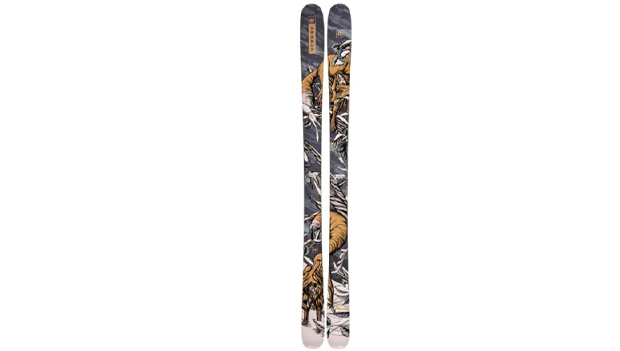
SPECS
- Size: 157cm, 164cm
- Weight (Pair): 6 lbs. 12.8 oz. (164cm)
- Material: Wood
- Waist width: 84mm
- Ski terrain: Pipe and groomed
The Armada ARV 84 twin-tip all-mountain skis are ultra-durable and can bear the abuse of mountain hits. Its caps and edges are specially heat-treated to take impacts and resist the damages. It is ideal for entry-level skiers who want to hit the ski park and aspiring freestyle skiers. The twin tip allows you to ski backward on groomed snow surfaces or pipes, adding to its maneuverability. Its low-in-weight wooden core construction is suitable for kids and lightweight skiers.
Armada ARV 84 skis do not excel particularly in anything, but they will let you start skiing without digging too deep into your pockets. Armada ARV 84 skis are not ideal for someone looking to ski in deep powder as the waist width is small for such conditions, but its tip rocker allows for navigating small bumps safely. They can do it all until you define your style of skiing, which will require more specialized skis.
What We Like
- Durability
- High-impact cap and edges construction
- Relatively cheap for aspiring freestyle skiers
What We Don't Like
- The waist width is small for ungroomed surfaces
- Not ideal for heavyweight skiers
BUY: Armada ARV 84 Skis
Best All-Mountain Skis for Women - Nordica Santa Ana Unlimited 88 Skis
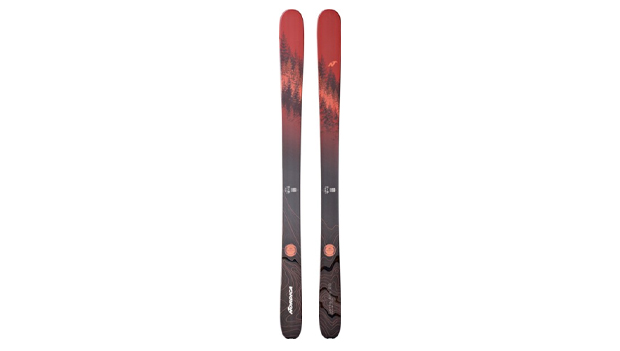
SPECS
- Size: 151cm, 158cm, 165cm, 172cm
- Weight (Pair): 5 lbs. 12.4 oz. (165cm)
- Material: Lite performance wood, sidewall and carbon
- Waist width: 88mm
- Ski terrain: Groomed
Nordica Santa Ana Unlimited 88 skis have a lightweight construction, designed especially for women who want to hit the slopes at the resort all day long and for ski touring. Its maneuverability at turns builds confidence on the slopes, keeping your skiing under control. The carbon chassis construction and lite performance wood improve efficiency on the ascents. It has no metal construction.
The smooth tip rocker with camber underfoot eases maneuvering around bumps and enhances its balanced performance. The extended wood core into the tip enhances performance on the slopes. The tail is pretty flat, which adds to its playfulness and floatation. Sidewall ABS construction keeps the skis stable and rigid when making snappy edge-to-edge turns. The waist width is ideal for people who want to broaden their horizons beyond resort skiing.
What We Like
- Lightweight construction
- All-mountain tip and tail rocker ski for touring
- Playfulness and floatation
What We Don't Like
- Lacks responsiveness
- Lacks versatility
BUY: NordicaSanta Ana Unlimited 88 Skis
Best All-Mountain Skis for Intermediate - Icelantic Pioneer 96 Skis
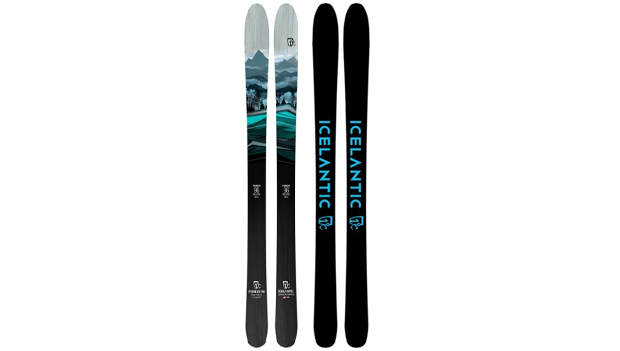
SPECS
- Size: 166cm, 174cm, 182cm, 188cm
- Weight (Pair): 7 lbs. 9 oz. (174cm)
- Material: Poplar wood
- Waist width: 96mm
- Ski terrain: Groomed and powder
Icelantic Pioneer 96 skis are a one-ski quiver that can deliver performance in all-terrain mountain conditions. The 96-millimeter waist width is ideal for groomers in a ski park and offers crud performance in deep powder conditions. The Icelantic Pioneer 96 ski delivers responsiveness and power for aggressive skiers. It has a reduced rocker in the tail for quick directional maneuverability around trees and other obstacles, and it is capable of making tight turns and nimble enough for power transition.
The tip rocker is designed to pivot quickly on turns and hardpack conditions. Five millimeters of camber underfoot makes it snappy and provides a wonderful experience for the groomers with a smooth and sturdy edge-to-edge transition. It holds an edge quite well on a hardpack with a full sidewall. It has an early taper on the front to deal with soft snow. It consists of a Poplar power core with no metal stringers, making its flex well-balanced throughout the ski. You need to be an experienced skier to use these powerful and aesthetically-designed skis to their full potential.
What We Like
- Directional maneuverability
- Design and artwork
- Versatility in all-mountain conditions
- Sturdy edge-to-edge transition
What We Don't Like
- Unstable at high speeds
- Relatively heavier
BUY: Icelantic SkisPioneer 96 Skis
Best Budget All-Mountain Skis - K2 Reckoner 92 Skis
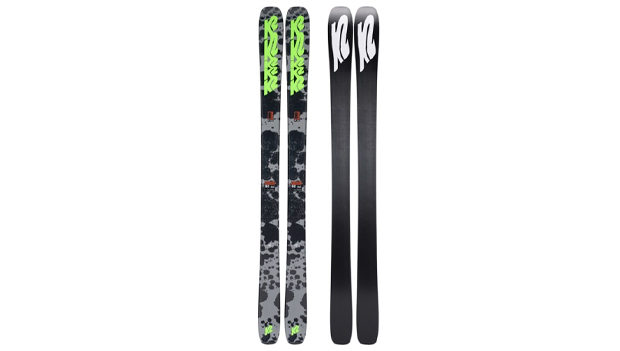
SPECS
- Size: 159cm, 169cm, 179cm
- Weight (Pair): 8 lbs. 0.2 oz. (179cm)
- Material: Aspen veneer
- Waist width: 92mm
- Ski terrain: Groomed
K2 Reckoner 92 skis consist of the company's patented process that interlocks fiberglass strands around mild wood to increase the torsional strength and durability. This process makes the skis strong while retaining the flex patterns. The twin tips of K2 Reckoner 92 skis make it conducive to backward skiing on groomed surfaces. The 92 millimeters waist width allows you to take it to the ski park, pipe, on and off-trail.
The sidewall construction around the midsection lets you move accurately and provides edge grip and torsional stiffness. The twin rocker profile on the tip and tail has an extended taper rise that adds to its versatility and floatation in snow conditions. These are a good pair of skis for beginners to mellow intermediates wanting to learn the ropes of skiing and freestyling. It is the go-to ski for a vast target audience to get started skiing or for those jumping from junior to adult skiing on a budget.
What We Like
- Playfulness due to good flex
- Lightweight
- Twin tips for backward skiing and freestyling
What We Don't Like
- Unstable at high speed for lightweight people
- Lacks responsiveness
BUY: K2 Reckoner 92 Skis
Best All-Mountain Skis for Men - Volkl M6 Mantra Skis
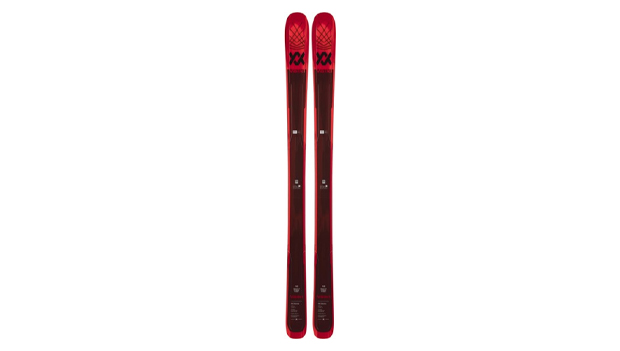
SPECS
- Size: 163cm, 170cm, 177cm, 184cm, 191cm
- Weight (Pair): 9 lbs. 2 oz. (177cm)
- Material: Wood with full sidewall
- Waist width: 96mm
- Ski terrain: Groomed and powder
Volkl M6 Mantra skis require experienced skiers to juice their maximum potential. These are highly versatile skies for people who love charging hard on downhills. They demand the skier's full attention and command of fundamentals. Their 3D Radius sidecut design gives you the liberty to maneuver the skies quickly in versatile terrain conditions. It's possible due to the longer radii in the tip and tail combined with a tighter radius under the foot. Tailored carbon tips let you change the direction quickly while keeping the skis lightweight.
Volkl M6 Mantra skis were designed keeping people of different sizes in mind and made the necessary changes in their construction. A tailored Titanal frame allows you to direct your energy straight on the skis and makes you go fast with precision. For skis with higher lengths, the metal bands are wider to provide bigger and more energetic skiers with more performance. Volkl M6 Mantras are versatile skis for groomed and for regions receiving moderate snowfall with their 96-millimeter camber underfoot.
What We Like
- Precise and sturdy at higher speeds
- Titanal metal bands construction
- Full sidewall construction
What We Don't Like
- Demands an experienced skier
- Lacks playfulness and forgiveness
BUY: Volkl M6 Mantra Skis
Best All-Mountain Skis for Beginners - Blizzard Thunderbird Sport 7.2 Skis
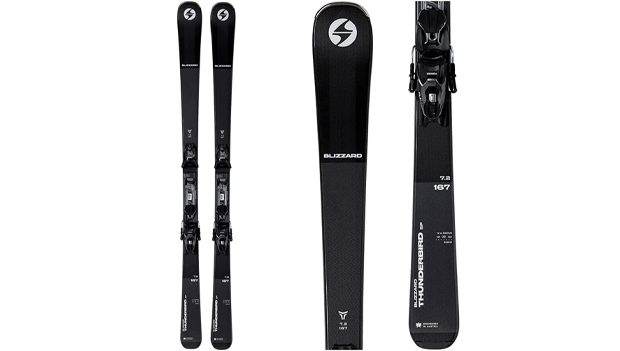
SPECS
- Size: 139cm, 146cm, 153cm, 160cm, 167cm, 174cm
- Weight (Pair): 7 lbs. 4.4 oz. (167cm)
- Material: Polyurethane with wood insert
- Waist width: 72mm
- Ski terrain: Groomed
Blizzard Thunderbird Sport 7.2 skis are meant for absolute beginners who have never skied before and want to buy their first pair of skis. They will help you to advance from a cautious beginner to a decent intermediate level without spending much. Blizzard Thunderbird Sport 7.2 are manageable skis meant for smooth groomed conditions. They have a 6-millimeter rocker at the tip and tail. Their 72-millimeter waist width makes them unsuitable for powder skiing.
These are super lightweight skis and very predictable on turns. These are best for slow speeds as they get pretty nervous quickly at moderate to higher speeds. The sidewall adds torsional stability at the edges. These skis will not challenge you and will make you feel comfortable on the slopes.
What We Like
- Lightweight
- Forgiveness for beginners
- Predictable on turns
What We Don't Like
- Not meant for powder skiing
- Durability
- Not suitable for heavy skiers
BUY: Blizzard Thunderbird SP 7
Best All-Mountain Skis for Powder - Salomon QST 106 Skis
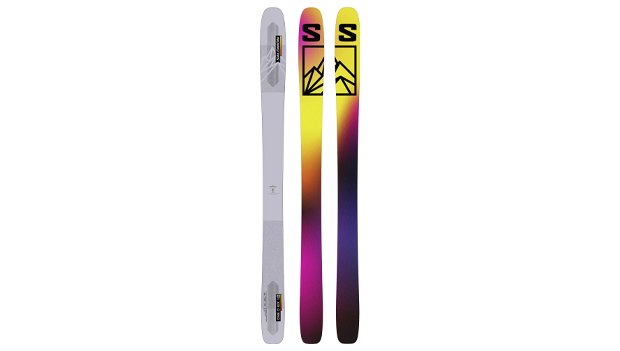
SPECS
- Size: 165cm, 173cm, 181cm, 189cm
- Weight (Pair): 8 lbs. 11.7 oz. (181cm)
- Material: Poplar wood
- Waist width: 106mm
- Ski terrain: Groomed and powder
Salomon QST 106 is a high-performing ski with enough rocker for deep snow skiers. Its longer rocker profile with a more tapered shape makes the pivoting swift and gives directional preciseness with a wide turn radius of about 20 meters. It has 106 millimeters of waist width underfoot to excel in deep powder conditions. It has a Poplar wood core with a double sidewall for a firm edge grip and torsional stiffness. A fiber layer of carbon and flax woven together gives this ski strength and stability. Cork inserts in the tip and tail offer a smooth ride downhill while eliminating chatter at high speed.
It comes to life in soft snow conditions with great floatation and showcases exceptional capabilities. It has a wide range of applications and versatility. It lacks playfulness but is excellent for hard-chargers who love a strong, controlled, predictable, and precise ski while venturing in the backcountry. Salomon QST 106 checks all the boxes to become the best all-mountain skis for powder conditions.
What We Like
- Great stability
- Preciseness in pivoting on turns
- Predictability
What We Don't Like
- It is not a lightweight ski
- Lacks playfulness
BUY: Salomon QST 106 Skis
Best All-Mountain Skis for Groomers - Rossignol Sender 94 Ti Skis
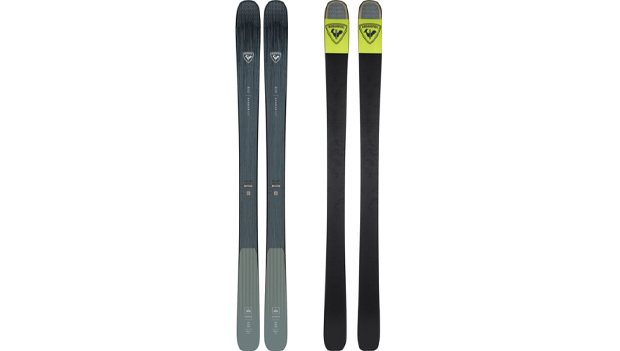
SPECS
- Size: 164cm, 172cm, 178cm, 186cm
- Weight (Pair): 7 lbs. 14.8 oz. (178cm)
- Material: Paulownia wood core with Titanal beam reinforcements
- Waist width: 94mm
- Ski terrain: Groomed and powder
Rossignol Sender 94 Ti skis provide skiers with the desired adrenaline rush with their speed and carving capabilities. They require a strong and expert pilot to derive their full potential. They deliver a blend of lightweight agility on the edges and damp unwanted vibrations for a smooth ride. They do not fare well in soft snow conditions because of the 94-millimeter underfoot width, thus lacking floatation. However, you can take it to a mixed off-trail and it performs excellently. With its rectangular sidewall construction and added torsional stiffness, you can cut deep into edges at speed and have complete control over the skis.
The Paulownia wood core is reinforced with Titanal beams to enhance rebound, amplified edge grip, and energy through the length of the ski. The Air Tip technology in the Rossignol Sender 94 Ti skis keeps it light and increases maneuverability. These have the full potential to become your one-ski quiver.
What We Like
- Agility and carving capabilities
- Lightweight
- Precision and edge grip
- Freestyling capabilities
What We Don't Like
- Lacks floatation
- Lacks forgiveness
BUY: RossignolSender 94 Ti Skis
Best All-Mountain Skis for Hard Snow - Kastle MX83 Ski
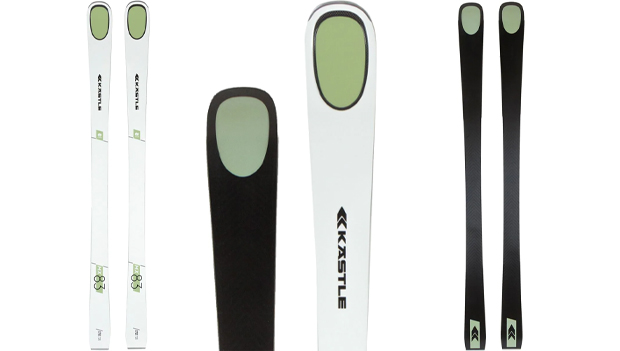
SPECS
- Size: 154cm, 161cm, 168cm, 175 cm, 182cm
- Weight (Pair): 8 lbs. 10.2 oz (182cm)
- Material: Poplar and beech with Titanal lamination
- Waist width: 83mm
- Ski terrain: Groomed and hardpack snow
Kastle MX 83 skis pack a punch for aggressive skiers who like trenching turn after turn. This ski displays hard-snow integrity and snaps out of turns with energetic rebounds. The exceptional edge grip predictably lets you carve confidently on firm snow and icy conditions. However, it lacks forgiveness and punishes the skier for poor skills. The 83-millimeter waist width and a rise at the tip make it a good ski option for off-trail conditions, as well.
Poplar and beech wood stringers with fiberglass sheets make the Kastle MX83 skis responsive and increase dampness. The sandwiched Titanal sheets in the frame deliver power and poppiness at turns. The early rise in the vibration-reducing tip makes edge-to-edge transitions smooth. The user-friendly flat tail provides stability when speed increases and while exiting turns. It is a demanding ski pair better suited for intermediate to advanced skiers.
What We Like
- Snappiness
- Highly responsive
- High energy transfer through the length of the ski
What We Don't Like
- Not suitable for soft snow, lacks flotation
- Lacking in forgiveness
BUY: Kastle MX83 Ski
How to Choose the Best All-Mountain Skis
While there are a variety of features and ski profiles you should look for in an all-mountain ski, the best starting point is to be sure of your ski style, size, kind of terrain you will be using your skis on, powder conditions, your abilities, and how often you will hit the slopes. The performance of skis depends upon how you use them. Start with these main points to look out for in your all-mountain skis to help you make an informed purchasing decision.
Length of Skis
Brands generally measure and list their ski sizes in centimeters. The general rule of thumb is to select the ski size that fits between your chin and head when standing on its tail on the ground. Shorter skis are easier to manage on turns and are lighter in weight. Longer skis (190+ centimeters) require strong and advanced skiers to maneuver on the slopes, but they are more stable at speed. If you are a beginner, selecting shorter skis will help you safely learn the basics of skiing. Depending on your abilities, choosing the correct ski size is vital for a comfortable experience on the slopes.
Weight
Heavier skis are more stable at speed and perform well in variable snow conditions—a good option for aggressive skiers. Smaller people and those who love hiking with their skis in the backcountry should choose lighter skis.
Materials
The materials used in making all-mountain skis give them their snappy and flexing properties. A carbon chassis or good quality Titanal metal sheets help manufacturers reduce weight while maintaining stiffness. Using Titanal in skis makes them chatter less at high speed and makes them responsive. The downside is that they become less playful. Skis with wood cores are more playful and have more flex. Beginners should go for skis having more flex.
Ski Stiffness
Ski stiffness is essential to consider depending on your experience and abilities. Stiff skis perform well on turns and hold edge pressure on hardpack snow. Stiff skis are stable at high speeds and favor advanced skiers. This quality makes them less playful and less forgiving. Soft flexing skis are more playful and forgiving, and better suited to beginners.
Manufacturers achieve ski stiffness by using materials like carbon, metal sheets, strands of fiberglass, etc. A wood-core ski is stiffer than a foam one but softer than the skis with inserted metal sheets like Titanal.
Waist Width
Waist width is critical in determining what kind of terrain and snow conditions it will perform better in. It says how wide the ski is right underfoot. All-mountain skis generally range from 85-105 and are measured in millimeters. Some skis go below 85 and above 105 millimeters, as well.
If you prefer off-piste and soft snow conditions, you are better off with wide waist-width skis for good floatation and stability. For hard snow and groomed snow skiers, skis with narrow waist width are preferable as they move quickly from edge to edge.
Sidecut and Turn Radius
Sidecut is the hourglass shape of modern skis that affects their turn radius. Shallow sidecuts help in big, wide turns, and deeper sidecuts result in tight turns. Different ski sizes of the same model have different turn radii. A ski's turn radius indicates an imaginary circle that would form with the sidecut's arc. A smaller turn radius means the ski can make tight turns and vice versa.
If you like making many small turns, a ski with a smaller turn radius will suit you, and if you want big playful turns, a ski with a higher turn radius will be the right choice.
Camber and Rocker Profile
All-mountain skis have a combo of rocker and camber, giving the ski unique characteristics. Camber is the upward arch in a ski when placed on level ground without putting any weight on it. Camber is generally underfoot in all-mountain skis. It gives a ski its poppiness, preciseness, and a stronghold at turns. Such skis perform best at high speed and hardpack snow, suitable for advanced and intermediate skiers.
Rocker is directly opposite of camber and is an upturn in a ski. The tip and tail rise upward, making the ski more suitable for soft snow and off-piste conditions while making the turn initiation easy and adding to its playfulness.
FAQs About All-Mountain Skis
How long do all-mountain skis last?
On average, a ski lasts around 120-150 days of skiing before it starts to lose its sheen. That makes it around five to six years if you ski 25-30 days in a season. They can even go up to a decade with good maintenance and skis with no structural damage.
How tall should all-mountain skis be?
A general rule of thumb is that the tip of all-mountain skis should come between your chin and the top of your head when standing straight on its tail. For beginners, skis with short lengths will give better control. Advanced skiers prefer longer skis as they are more stable at speed.
How wide should all-mountain skis be?
All-mountain skis generally range from 85-105 millimeters underfoot. Some are narrower and wider than this range. Depending upon your preference and the terrain you ski on, choose a ski that is suitable to the snow conditions you prefer. For groomers and firm snow conditions, you should choose the one with lower waist width. For powder and soft snow skiers, skis with higher widths will give great floatation and stability.
What makes an all-mountain ski?
An all-mountain ski is versatile because it can handle soft snow conditions, deep powder, off-piste, groomed snow, and icy slope terrain. Their waist width usually ranges from 85-105 millimeters. These are well-suited for beginners or someone who has not yet determined their skiing style. It allows you to ski in diverse snow conditions. Depending upon your preference, you should choose a ski with relevant waist width underfoot accordingly.

